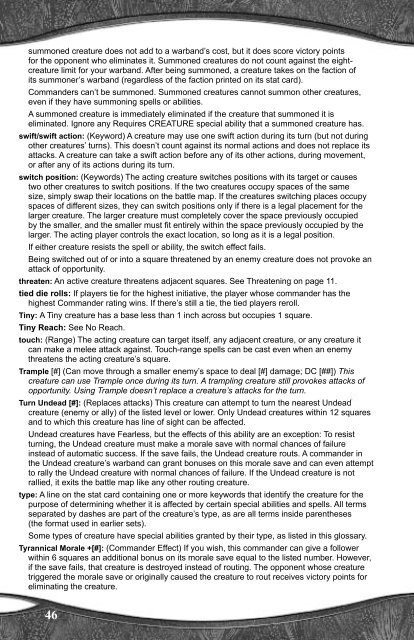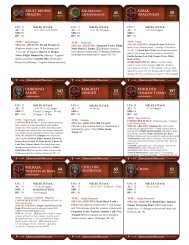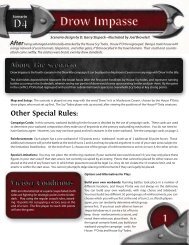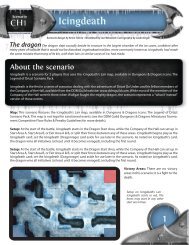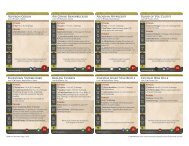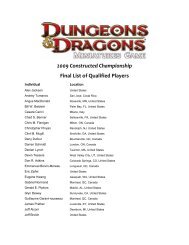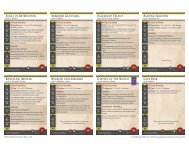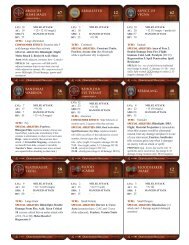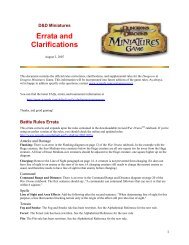You also want an ePaper? Increase the reach of your titles
YUMPU automatically turns print PDFs into web optimized ePapers that Google loves.
summoned creature does not add to a warband’s cost, but it does score victory points<br />
for the opponent who eliminates it. Summoned creatures do not count against the eightcreature<br />
limit for your warband. After being summoned, a creature takes on the faction of<br />
its summoner’s warband (regardless of the faction printed on its stat card).<br />
Commanders can’t be summoned. Summoned creatures cannot summon other creatures,<br />
even if they have summoning spells or abilities.<br />
A summoned creature is immediately eliminated if the creature that summoned it is<br />
eliminated. Ignore any Requires CREATURE special ability that a summoned creature has.<br />
swift/swift action: (Keyword) A creature may use one swift action during its turn (but not during<br />
other creatures’ turns). This doesn’t count against its normal actions and does not replace its<br />
attacks. A creature can take a swift action before any of its other actions, during movement,<br />
or after any of its actions during its turn.<br />
switch position: (Keywords) The acting creature switches positions with its target or causes<br />
two other creatures to switch positions. If the two creatures occupy spaces of the same<br />
size, simply swap their locations on the battle map. If the creatures switching places occupy<br />
spaces of different sizes, they can switch positions only if there is a legal placement for the<br />
larger creature. The larger creature must completely cover the space previously occupied<br />
by the smaller, and the smaller must fit entirely within the space previously occupied by the<br />
larger. The acting player controls the exact location, so long as it is a legal position.<br />
If either creature resists the spell or ability, the switch effect fails.<br />
Being switched out of or into a square threatened by an enemy creature does not provoke an<br />
attack of opportunity.<br />
threaten: An active creature threatens adjacent squares. See Threatening on page 11.<br />
tied die rolls: If players tie for the highest initiative, the player whose commander has the<br />
highest Commander rating wins. If there’s still a tie, the tied players reroll.<br />
Tiny: A Tiny creature has a base less than 1 inch across but occupies 1 square.<br />
Tiny Reach: See No Reach.<br />
touch: (Range) The acting creature can target itself, any adjacent creature, or any creature it<br />
can make a melee attack against. Touch-range spells can be cast even when an enemy<br />
threatens the acting creature’s square.<br />
Trample [#] (Can move through a smaller enemy’s space to deal [#] damage; DC [##]) This<br />
creature can use Trample once during its turn. A trampling creature still provokes attacks of<br />
opportunity. Using Trample doesn’t replace a creature’s attacks for the turn.<br />
Turn Undead [#]: (Replaces attacks) This creature can attempt to turn the nearest Undead<br />
creature (enemy or ally) of the listed level or lower. Only Undead creatures within 12 squares<br />
and to which this creature has line of sight can be affected.<br />
Undead creatures have Fearless, but the effects of this ability are an exception: To resist<br />
turning, the Undead creature must make a morale save with normal chances of failure<br />
instead of automatic success. If the save fails, the Undead creature routs. A commander in<br />
the Undead creature’s warband can grant bonuses on this morale save and can even attempt<br />
to rally the Undead creature with normal chances of failure. If the Undead creature is not<br />
rallied, it exits the battle map like any other routing creature.<br />
type: A line on the stat card containing one or more keywords that identify the creature for the<br />
purpose of determining whether it is affected by certain special abilities and spells. All terms<br />
separated by dashes are part of the creature’s type, as are all terms inside parentheses<br />
(the format used in earlier sets).<br />
Some types of creature have special abilities granted by their type, as listed in this glossary.<br />
Tyrannical Morale +[#]: (Commander Effect) If you wish, this commander can give a follower<br />
within 6 squares an additional bonus on its morale save equal to the listed number. However,<br />
if the save fails, that creature is destroyed instead of routing. The opponent whose creature<br />
triggered the morale save or originally caused the creature to rout receives victory points for<br />
eliminating the creature.<br />
46


